Unit 3 Could you please clean your room Section A 3a-3c课件(共29张PPT)
文档属性
| 名称 | Unit 3 Could you please clean your room Section A 3a-3c课件(共29张PPT) |
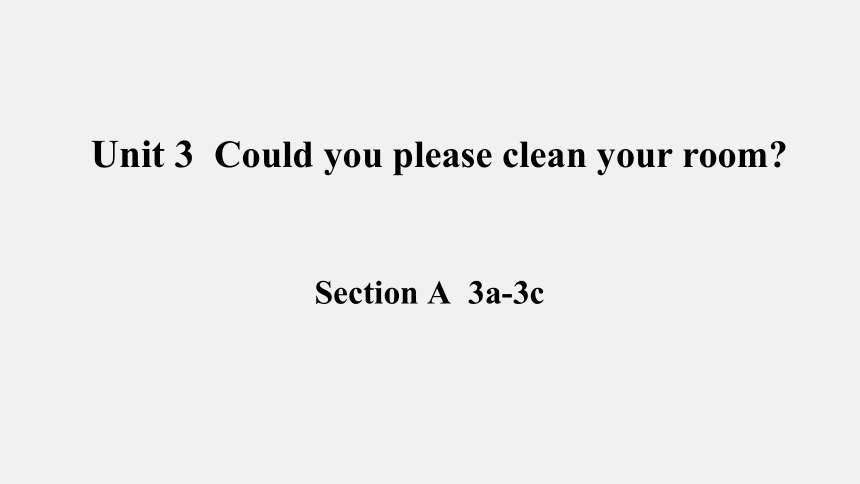
|
|
| 格式 | pptx | ||
| 文件大小 | 23.6MB | ||
| 资源类型 | 教案 | ||
| 版本资源 | 人教新目标(Go for it)版 | ||
| 科目 | 英语 | ||
| 更新时间 | 2024-03-15 00:00:00 | ||
图片预览

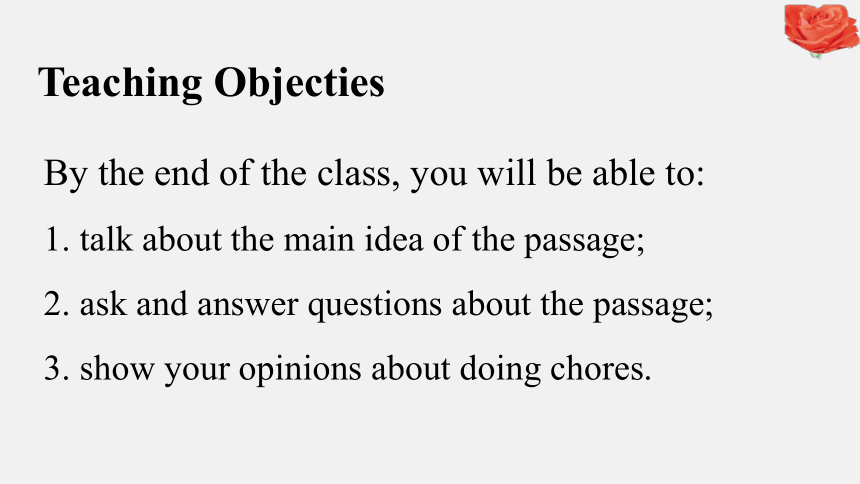

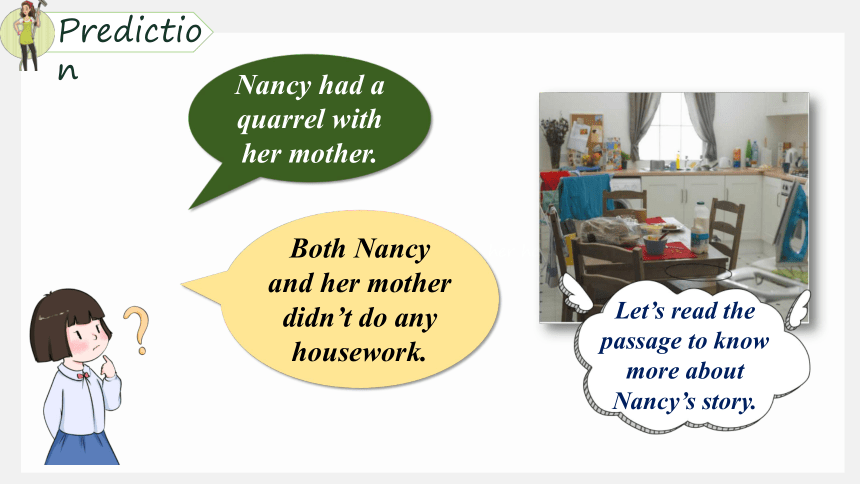
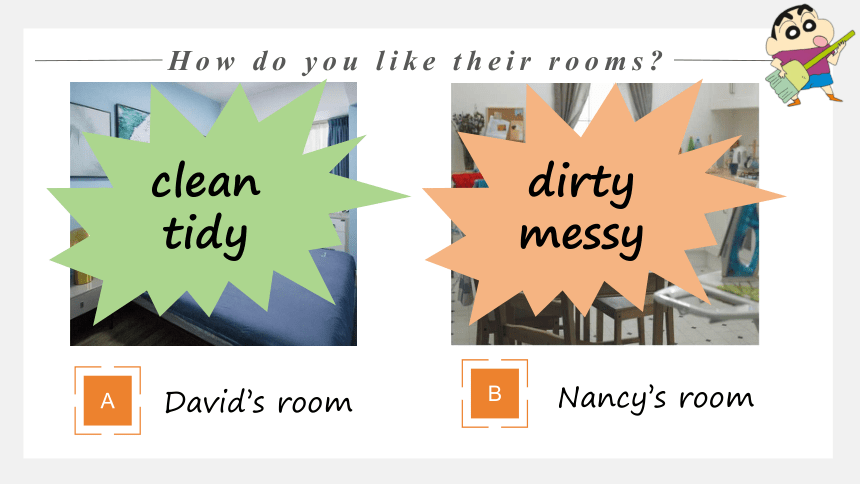
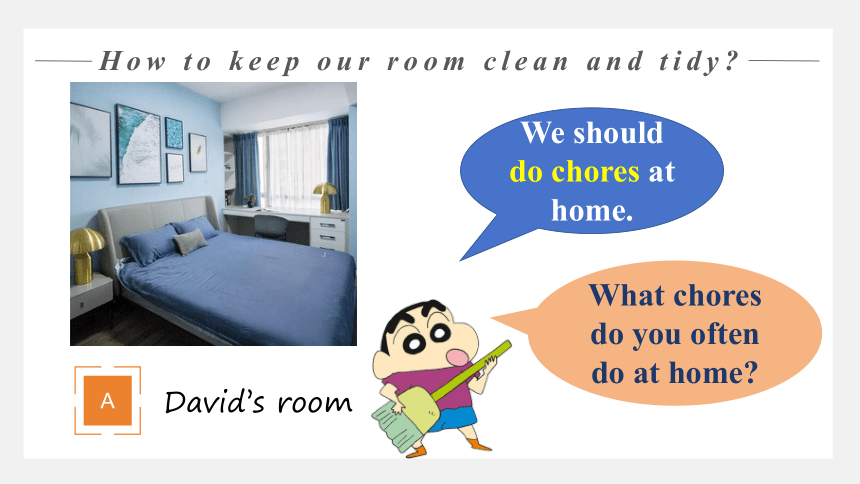
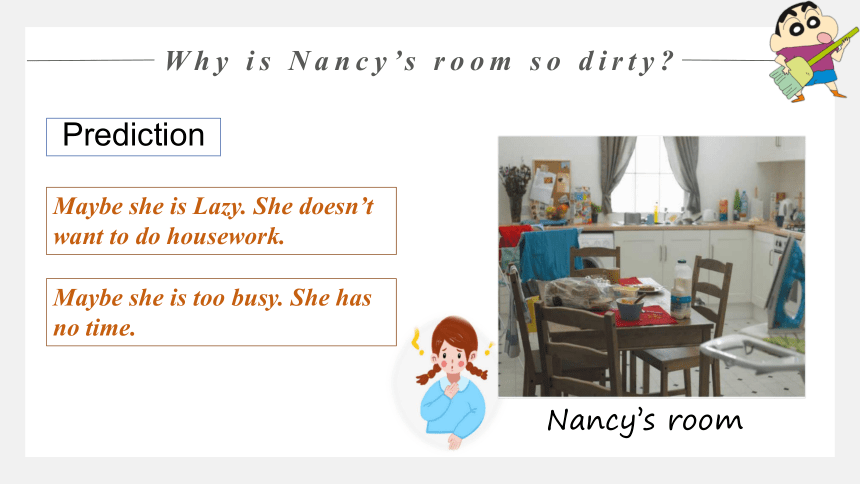
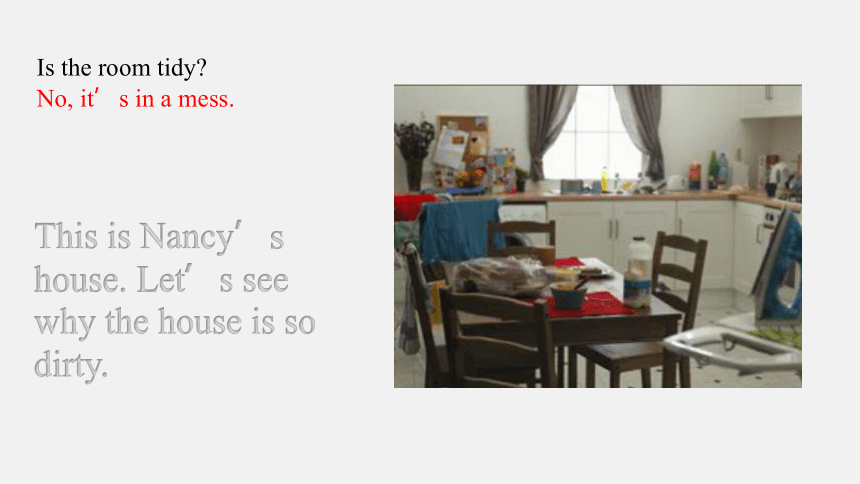
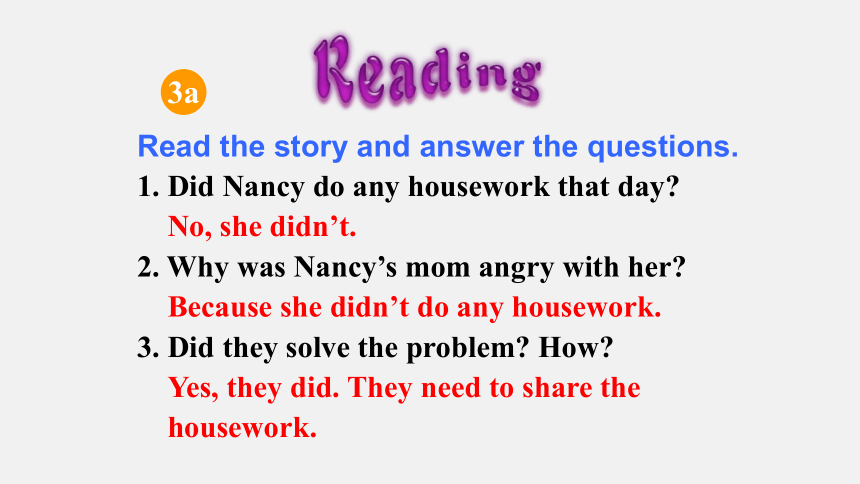
文档简介
(共29张PPT)
Unit 3 Could you please clean your room
Section A 3a-3c
Teaching Objecties
By the end of the class, you will be able to:
1. talk about the main idea of the passage;
2. ask and answer questions about the passage;
3. show your opinions about doing chores.
Nancy invited peter to her home.
Prediction
Watch the video and find out the answer.
Nancy invited peter to her home.
Prediction
Nancy had a quarrel with her mother.
Both Nancy
and her mother didn’t do any housework.
Let’s read the passage to know
more about Nancy’s story.
A
B
How do you like their rooms
Nancy’s room
David’s room
clean
tidy
dirty
messy
A
How to keep our room clean and tidy
David’s room
We should do chores at home.
What chores do you often do at home
Nancy’s room
Why is Nancy’s room so dirty
Prediction
Maybe she is Lazy. She doesn’t want to do housework.
Maybe she is too busy. She has no time.
Is the room tidy
No, it’s in a mess.
This is Nancy’s house. Let’s see why the house is so dirty.
Read the story and answer the questions.
1. Did Nancy do any housework that day
2. Why was Nancy’s mom angry with her
3. Did they solve the problem How
No, she didn’t.
Because she didn’t do any housework.
Yes, they did. They need to share the housework.
3a
1. Why was Nancy’s
mom angry with
her
2. Did they solve
the problem
How
①
②
③
②
①
④
Read and answer.
Careful Reading
What did they do after the argument
When and where did the argument take place
Why did Nancy argue with her mom
What did Nancy learn from the argument
Match each part with its main idea.
Part 1
Part 2
Part 3
Part 4
Fast reading
Part 1
Last month, our dog welcomed me when I came home from school. He wanted a walk, but I was too tired. I threw down my bag and went to the living room. The minute I sat down in front of the TV, my mom came over .
situation
Nancy’s story
When
Where
Who
Last month
At home
Nancy and her mom
课堂同步
Part 1
Read Part 1 again and finish the chart.
Names Actions Feelings (Information behind the words)
Nancy
The dog
Mom
came home from school
threw down the bag
went to the living room
sat down in front of the TV
tired
welcomed Nancy
and wanted a walk
happy
came over
tired
a little angry
situation
课堂同步
The minute I sat down in front of the TV, my mom came over.
As soon as
Maybe Nancy always watches TV after coming back from school.
angry
Why: Nancy watches TV _______________ and ___________ helps out around the house, so her mother was __________ with her. However ,Nancy thought she _________________ and was as_____ as her mom.
Part 2
“Could you please take the dog for a walk ” she asked .
“Could I watch one show first ” I asked.
“ No!”she replied angrily.“You watch TV all the time and never help out around the house! I can’t work all day and do housework all evening.”
“ Well, I work all day at school, too!
I’m just as tired as you are!”I shouted back.
conflict
What:
Nancy’s mother wanted Nancy to ______________________first but Nancy wanted to _________________ first.
take the dog for a walk
watch one show
Why:
Nancy watches TV _______________ and ___________ helps out around the house, so her mother was __________ with her. However ,Nancy thought she ______________________ and was as_____ as her mom.
all the time
never
angry
work all day at school
tired
课堂同步
Presentation
Summarize the passage.
asked the daughter to take the dog for a walk
replied angrily
walked away without saying anything
didn’t do any housework
Mom’s activities
feeling
feeling
found the house clean and tidy
asked in surprise
did the housework
say sorry to her mom
Nancy’s activities
tired and angry
tired and angry
came home and watched TV
shouted back
didn’t do any housework
couldn’t find a clean dish or shirt
surprised and
happy
Regretful and
happy
(后悔的)
Presentation
Work on 3b.
3b
Read the sentences below. Underline the sentences from the reading that mean the same thing.
The minute=as soon as
1. Neither of us did any housework for a week.
2.My mom came over as soon as I sat down in front of the TV..
3. You’re tired, but I’m tired, too.
as...as=too
neither of us did=neither did I
Presentation
Work on 3c.
Decide whether(是否) the underlined words in the sentences are verbs or nouns. Then write another sentence using the underlined word in the other form.
3c
1. Could you take the dog for a walk (noun)→
I walked home from shcool. (verb)
2. Could I watch one show first
3. I can't work all day.
4. You watch TV all the time.
5. “What happened ” she asked in surprise.
Could you show me your new book (verb)
I have a lot of work to do today. (noun)
My mother bought me a new watch last week. (noun)
The news surprised us greatly. (verb)
Presentation
Work on 3c.
3c
Decide whether underlined words are verbs or nouns.
noun.
walk home; walk to school
verb.
noun.
Can you show me
your watch
verb.
I have a lot of work to do
noun.
The news surprised all of us.
Language points
a)Chris was not at home and neither _____ his sister.
For one week,she did not do any housework and neither did I.
b)My father can’t swim and neither _____ I.
“neither+助动词(be动词/情态动词/do)+主语”是倒装结构,表示前面所述否定内容适用于另一人或物。
neither可用nor替换。
Practice:
c)Tom didn’t believe a word she said, and neither _____ the police.
was
can
did
Language points
The minute I sat down in front of the TV,my mom came over.
the minute意为“一…….就……”,和as soon as与the moment的意思相同,通常用作连词引导时间状语从句。
The minute the school is over, I will go back home.
I will go back home as soon as the school is over.
例如:
The moment the school is over, I will go back home.
我一放学就回家。
2. I’m just as tired as you are!
as ... as 意为 “和……一样” ,表示同级的比较。使用时要注意第一个as为副词,第二个as为连词。其基本结构为:as + adj./ adv. + as。
e.g. This film is as interesting as that one.
这部电影和那部电影一样有趣。
Your pen writes as smoothly as mine.
你的钢笔书写起来和我的一样流畅。
as … as 的否定形式为 “not as/so + adj./adv. + as”。
e.g. He didn’t act as well as you.
他表现得不如你好。
3. For one week, she did not do any housework and neither did I.
neither的意思是(两者间的任意一个)都不,也不,表示否定。当它作为形容词时,后面要接可数名词单数,谓语动词要用单数形式;当它作为副词时,后面的句子通常要倒装;当它作为代词时,后面要与of+名词/代词复数使用;当它作为连词时,通常与nor连用,并且谓语动词应与离它最近的主语在人称和数上保持一致,也就是遵循“就近一致”的原则。
e.g. — I don’t like this dress. 我不喜欢这件连衣裙。
— Neither / Nor do I. 我也不喜欢。
注意:neither 之后的主语要置于助动词或系动词之后。
neither 用作代词,表示“两者都不,双方均不”。
e.g. He answered neither of the letters. 他两封信都没回。
— Which one would you like 你喜欢哪一个?
— Neither. 两个都不喜欢。
also, too, either, neither的用法
1. also 是比较正式的用语,语气较庄重。它通常放在句中,位于行为动词之前,连系动词之后; 如有助动词或情态动词,一般放在助动词或情态动词之后。
e.g. Peter also has two brothers. 彼得也有两个兄弟。
I am also a student. 我也是一名学生。
Mrs. Green can also sing the song in Chinese.
格林夫人也能用汉语唱这首歌。
2. too 是普通用词,多用于口语,语气较随便。一般用在肯定句中,放在句末。
e.g. I’m in Row 1, too. 我也在第一排。
注意:also和too一般都用于肯定句, 很少用于否定句。
3. either 表示“也”时,一般只用于否定句,且置于句末。
e.g. I don’t know him. Tom doesn’t know him, either.
我不认识他,汤姆也不认识他。
If you don’t go there, he won’t go there, either.
如果你不去那儿,他也不会去那儿。
注意:either 本身没有否定的意义。所以多与 not 连用。
4. neither 表示“两个都不”,它作主语时,谓语动词常用单数。
e.g. Neither of you can do it.
你们两个都不能做这件事。
One day, when Nancy came home _______ school, her mom came ______ and wanted her _________ the dog for a walk. But she was too tired ______ do that. So, she said “No!” to her mom. Her mom got angry _______ Nancy. Because she worked all day and was so tired ________ she couldn’t do so much housework.
Summary of key points
from
over
to take
to
with
that
The next week neither Nancy ________ her mother _________ any housework. The house was too
________. And Nancy couldn’t find anything clean. At last, Nancy cleaned the house and this really ___________ her mother. Nancy understood that she need _________ the housework ________ her mother __________ a clean and comfortable home.
nor
did
messy
surprised
to share
with
to have
Unit 3 Could you please clean your room
Section A 3a-3c
Teaching Objecties
By the end of the class, you will be able to:
1. talk about the main idea of the passage;
2. ask and answer questions about the passage;
3. show your opinions about doing chores.
Nancy invited peter to her home.
Prediction
Watch the video and find out the answer.
Nancy invited peter to her home.
Prediction
Nancy had a quarrel with her mother.
Both Nancy
and her mother didn’t do any housework.
Let’s read the passage to know
more about Nancy’s story.
A
B
How do you like their rooms
Nancy’s room
David’s room
clean
tidy
dirty
messy
A
How to keep our room clean and tidy
David’s room
We should do chores at home.
What chores do you often do at home
Nancy’s room
Why is Nancy’s room so dirty
Prediction
Maybe she is Lazy. She doesn’t want to do housework.
Maybe she is too busy. She has no time.
Is the room tidy
No, it’s in a mess.
This is Nancy’s house. Let’s see why the house is so dirty.
Read the story and answer the questions.
1. Did Nancy do any housework that day
2. Why was Nancy’s mom angry with her
3. Did they solve the problem How
No, she didn’t.
Because she didn’t do any housework.
Yes, they did. They need to share the housework.
3a
1. Why was Nancy’s
mom angry with
her
2. Did they solve
the problem
How
①
②
③
②
①
④
Read and answer.
Careful Reading
What did they do after the argument
When and where did the argument take place
Why did Nancy argue with her mom
What did Nancy learn from the argument
Match each part with its main idea.
Part 1
Part 2
Part 3
Part 4
Fast reading
Part 1
Last month, our dog welcomed me when I came home from school. He wanted a walk, but I was too tired. I threw down my bag and went to the living room. The minute I sat down in front of the TV, my mom came over .
situation
Nancy’s story
When
Where
Who
Last month
At home
Nancy and her mom
课堂同步
Part 1
Read Part 1 again and finish the chart.
Names Actions Feelings (Information behind the words)
Nancy
The dog
Mom
came home from school
threw down the bag
went to the living room
sat down in front of the TV
tired
welcomed Nancy
and wanted a walk
happy
came over
tired
a little angry
situation
课堂同步
The minute I sat down in front of the TV, my mom came over.
As soon as
Maybe Nancy always watches TV after coming back from school.
angry
Why: Nancy watches TV _______________ and ___________ helps out around the house, so her mother was __________ with her. However ,Nancy thought she _________________ and was as_____ as her mom.
Part 2
“Could you please take the dog for a walk ” she asked .
“Could I watch one show first ” I asked.
“ No!”she replied angrily.“You watch TV all the time and never help out around the house! I can’t work all day and do housework all evening.”
“ Well, I work all day at school, too!
I’m just as tired as you are!”I shouted back.
conflict
What:
Nancy’s mother wanted Nancy to ______________________first but Nancy wanted to _________________ first.
take the dog for a walk
watch one show
Why:
Nancy watches TV _______________ and ___________ helps out around the house, so her mother was __________ with her. However ,Nancy thought she ______________________ and was as_____ as her mom.
all the time
never
angry
work all day at school
tired
课堂同步
Presentation
Summarize the passage.
asked the daughter to take the dog for a walk
replied angrily
walked away without saying anything
didn’t do any housework
Mom’s activities
feeling
feeling
found the house clean and tidy
asked in surprise
did the housework
say sorry to her mom
Nancy’s activities
tired and angry
tired and angry
came home and watched TV
shouted back
didn’t do any housework
couldn’t find a clean dish or shirt
surprised and
happy
Regretful and
happy
(后悔的)
Presentation
Work on 3b.
3b
Read the sentences below. Underline the sentences from the reading that mean the same thing.
The minute=as soon as
1. Neither of us did any housework for a week.
2.My mom came over as soon as I sat down in front of the TV..
3. You’re tired, but I’m tired, too.
as...as=too
neither of us did=neither did I
Presentation
Work on 3c.
Decide whether(是否) the underlined words in the sentences are verbs or nouns. Then write another sentence using the underlined word in the other form.
3c
1. Could you take the dog for a walk (noun)→
I walked home from shcool. (verb)
2. Could I watch one show first
3. I can't work all day.
4. You watch TV all the time.
5. “What happened ” she asked in surprise.
Could you show me your new book (verb)
I have a lot of work to do today. (noun)
My mother bought me a new watch last week. (noun)
The news surprised us greatly. (verb)
Presentation
Work on 3c.
3c
Decide whether underlined words are verbs or nouns.
noun.
walk home; walk to school
verb.
noun.
Can you show me
your watch
verb.
I have a lot of work to do
noun.
The news surprised all of us.
Language points
a)Chris was not at home and neither _____ his sister.
For one week,she did not do any housework and neither did I.
b)My father can’t swim and neither _____ I.
“neither+助动词(be动词/情态动词/do)+主语”是倒装结构,表示前面所述否定内容适用于另一人或物。
neither可用nor替换。
Practice:
c)Tom didn’t believe a word she said, and neither _____ the police.
was
can
did
Language points
The minute I sat down in front of the TV,my mom came over.
the minute意为“一…….就……”,和as soon as与the moment的意思相同,通常用作连词引导时间状语从句。
The minute the school is over, I will go back home.
I will go back home as soon as the school is over.
例如:
The moment the school is over, I will go back home.
我一放学就回家。
2. I’m just as tired as you are!
as ... as 意为 “和……一样” ,表示同级的比较。使用时要注意第一个as为副词,第二个as为连词。其基本结构为:as + adj./ adv. + as。
e.g. This film is as interesting as that one.
这部电影和那部电影一样有趣。
Your pen writes as smoothly as mine.
你的钢笔书写起来和我的一样流畅。
as … as 的否定形式为 “not as/so + adj./adv. + as”。
e.g. He didn’t act as well as you.
他表现得不如你好。
3. For one week, she did not do any housework and neither did I.
neither的意思是(两者间的任意一个)都不,也不,表示否定。当它作为形容词时,后面要接可数名词单数,谓语动词要用单数形式;当它作为副词时,后面的句子通常要倒装;当它作为代词时,后面要与of+名词/代词复数使用;当它作为连词时,通常与nor连用,并且谓语动词应与离它最近的主语在人称和数上保持一致,也就是遵循“就近一致”的原则。
e.g. — I don’t like this dress. 我不喜欢这件连衣裙。
— Neither / Nor do I. 我也不喜欢。
注意:neither 之后的主语要置于助动词或系动词之后。
neither 用作代词,表示“两者都不,双方均不”。
e.g. He answered neither of the letters. 他两封信都没回。
— Which one would you like 你喜欢哪一个?
— Neither. 两个都不喜欢。
also, too, either, neither的用法
1. also 是比较正式的用语,语气较庄重。它通常放在句中,位于行为动词之前,连系动词之后; 如有助动词或情态动词,一般放在助动词或情态动词之后。
e.g. Peter also has two brothers. 彼得也有两个兄弟。
I am also a student. 我也是一名学生。
Mrs. Green can also sing the song in Chinese.
格林夫人也能用汉语唱这首歌。
2. too 是普通用词,多用于口语,语气较随便。一般用在肯定句中,放在句末。
e.g. I’m in Row 1, too. 我也在第一排。
注意:also和too一般都用于肯定句, 很少用于否定句。
3. either 表示“也”时,一般只用于否定句,且置于句末。
e.g. I don’t know him. Tom doesn’t know him, either.
我不认识他,汤姆也不认识他。
If you don’t go there, he won’t go there, either.
如果你不去那儿,他也不会去那儿。
注意:either 本身没有否定的意义。所以多与 not 连用。
4. neither 表示“两个都不”,它作主语时,谓语动词常用单数。
e.g. Neither of you can do it.
你们两个都不能做这件事。
One day, when Nancy came home _______ school, her mom came ______ and wanted her _________ the dog for a walk. But she was too tired ______ do that. So, she said “No!” to her mom. Her mom got angry _______ Nancy. Because she worked all day and was so tired ________ she couldn’t do so much housework.
Summary of key points
from
over
to take
to
with
that
The next week neither Nancy ________ her mother _________ any housework. The house was too
________. And Nancy couldn’t find anything clean. At last, Nancy cleaned the house and this really ___________ her mother. Nancy understood that she need _________ the housework ________ her mother __________ a clean and comfortable home.
nor
did
messy
surprised
to share
with
to have
同课章节目录
- Unit 1 What's the matter?
- Section A
- Section B
- Unit 2 I'll help to clean up the city parks.
- Section A
- Section B
- Unit 3 Could you please clean your room?
- Section A
- Section B
- Unit 4 Why don't you talk to your parents?
- Section A
- Section B
- Unit 5 What were you doing when the rainstorm came
- Section A
- Section B
- Review of Units 1-5
- Unit 6 An old man tried to move the mountains.
- Section A
- Section B
- Unit 7 What's the highest mountain in the world?
- Section A
- Section B
- Unit 8 Have you read Treasure Island yet?
- Section A
- Section B
- Unit 9 Have you ever been to a museum?
- Section A
- Section B
- Unit 10 I've had this bike for three years.
- Section A
- Section B
